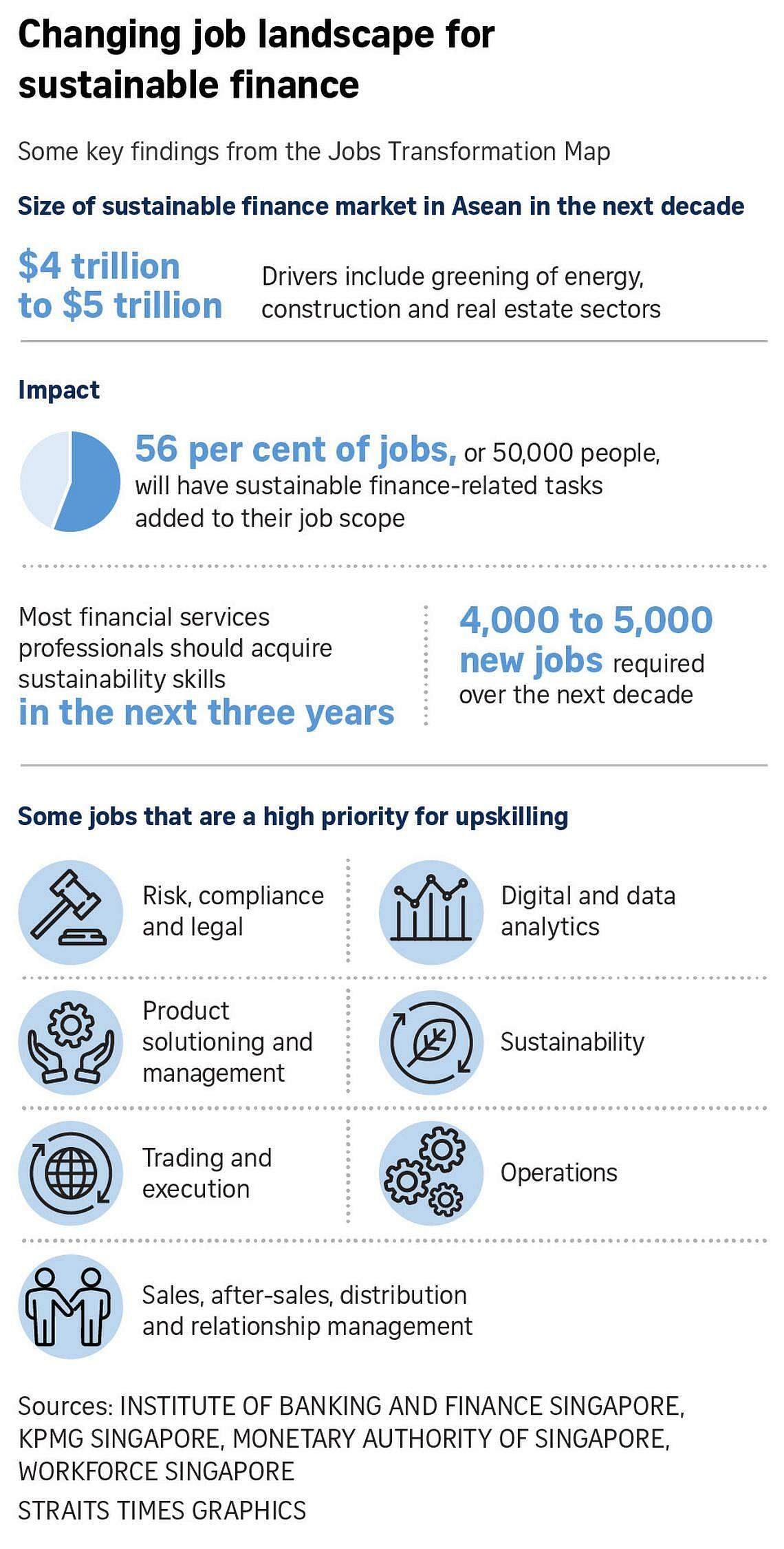SINGAPORE - As Singapore looks to become a green finance hub, the Government is pumping in $35 million to help those in the financial services sector pick up new skills to better serve sustainable financing demands in the region.
More than 50,000 people in jobs from sales to risk, compliance and legal, will have new sustainable finance-related job tasks added to their critical work functions, from a “moderate to high degree”, according to a study commissioned by the Monetary Authority of Singapore (MAS) and Institute of Banking and Finance Singapore (IBF).
This comes as the sustainable finance market in Asean is expected to amount to $4 trillion to $5 trillion in the next decade, with financial institutions playing a key role in helping to catalyse the transformation needed.
The largest demand drivers behind the region’s sustainable financing needs are the energy, and construction and real estate sectors, such as deploying renewable energy, electricity distribution and the greening of commercial buildings.
Speaking at the launch of the Sustainable Finance Jobs Transformation Map at the Ecosperity conference on April 17, Minister of State for Trade and Industry Alvin Tan said: “If Singapore is to be Asia’s leading sustainable finance hub, we must equip our workforce to be ahead of complex and fast-evolving sustainable finance-related issues and opportunities.”
Therefore, Singapore’s financial services sector workforce should aim to acquire new skills within the next three years to seize these available opportunities, MAS, IBF and Workforce Singapore said on April 17.
Mr Tan noted that more than 25 financial institutions in Singapore are already planning to upskill their staff over the next three years.
According to the Jobs Transformation Map report by KPMG Singapore, some 20 unique job roles, particularly those in sales and relationship management, have been identified as high-priority roles for upskilling.
For instance, a relationship manager in corporate banking will have to know the decarbonisation pathways for certain sectors, and how sustainable finance instruments like green bonds work, to be able to explain these to his client.
The report also anticipates that about 4,000 to 5,000 new sustainable finance-related jobs will be required over the next decade, ranging from sustainability risk to sustainable strategy.
This comes as financial institutions are increasingly prioritising sustainability as a core business strategy for their organisations.
“Specialised and deep sustainable finance skill sets will be required to perform these job roles,” the report added.
To help develop these sustainability finance specialists over the next three years, MAS said it has set aside $35 million in the Financial Sector Development Fund to support professionals in acquiring these new skills.
One of the top technical skills required for sustainable finance is climate change management – where one is able to ensure that climate risks are integrated into a firm’s wider risk management strategy, and identify opportunities to develop products that support climate change mitigation and adaptation.
One must also be able to effectively and accurately measure sustainability outcomes from investments and financial products.

Institutes of higher learning will be expanding their suite of sustainable finance courses.
For instance, more than 65 new executive courses will be made available in 2024, conducted by institutes like the Singapore Green Finance Centre, which was launched by Singapore Management University and Imperial College London, as well as the Sustainable and Green Finance Institute at the National University of Singapore (NUS). This builds on a base of more than 100 such courses available currently.
The Singapore Green Finance Centre has launched three online courses on sustainability stewardship, carbon markets and sustainable investment management targeted at mid-career professionals looking to pivot into the space.
A fourth online course, which is an introduction to sustainability and sustainable finance with a focus on Asia, will be made available to the public for free in a bid to raise awareness among them.
Two new undergraduate programmes on sustainable finance will also be developed by Nanyang Technological University (NTU) and NUS.
NTU’s bachelor of accounting in sustainable management will be available for enrolment from August 2024.
Ms Nikki Kemp, executive director of the Singapore Green Finance Centre, is hoping to collaborate across different universities here to offer a wider variety of training courses, particularly in nature-based solutions and climate science, as these are emerging areas of focus in the finance sector.
She also hopes for more resources to be poured into developing the academic capacity locally to support more such courses in future.
Meanwhile, the Asia Centre of Carbon Excellence was launched on April 17 to help bring together a group of international experts focused on innovative and novel carbon project development, carbon policy and capacity-building.
Launched jointly by climate consultancy South Pole and Temasek-backed investment platform GenZero, the core focus of the centre is to unlock new approaches to mitigate global greenhouse gas emissions as quickly as possible.
For instance, in the near term, the centre will look at using carbon credits to scale up and commercialise the use of green hydrogen, which is thought to be a clean fuel as it does not produce any planet-warming emissions when burned.
The centre will also help support governments and businesses on using carbon markets to meet their national climate targets under the 2015 Paris Agreement.


